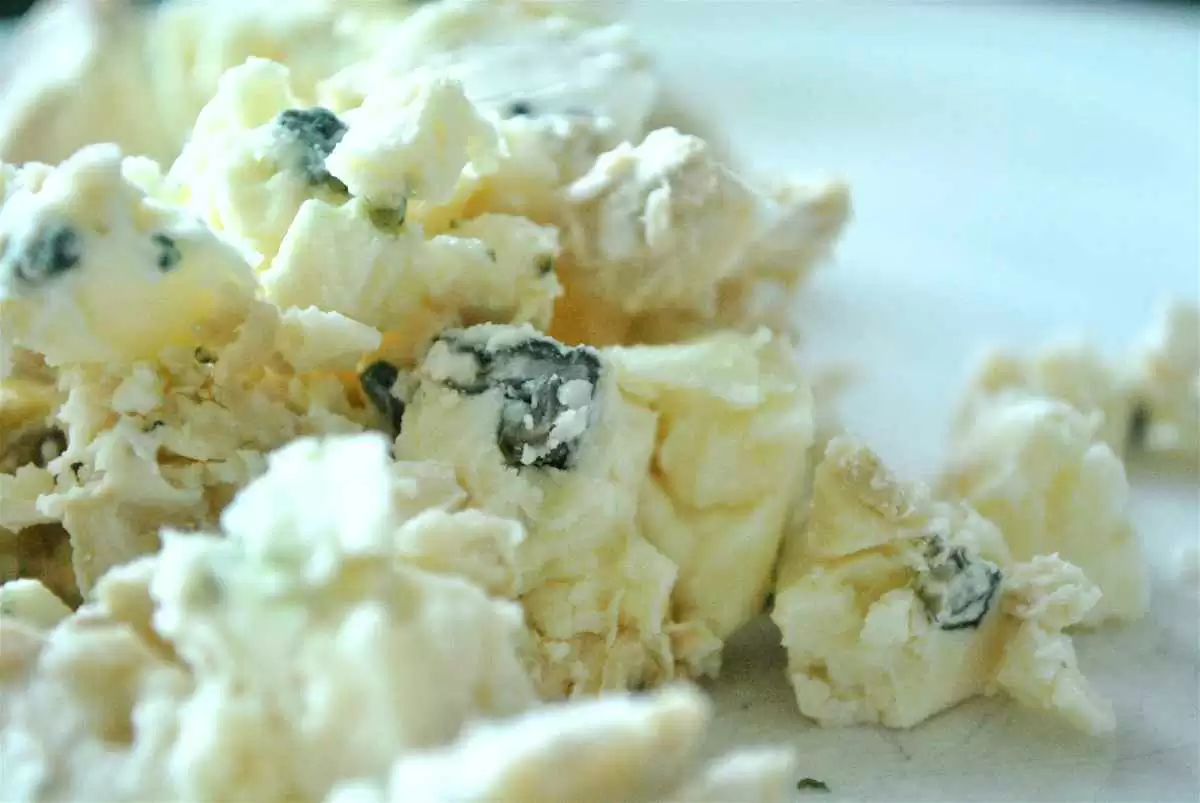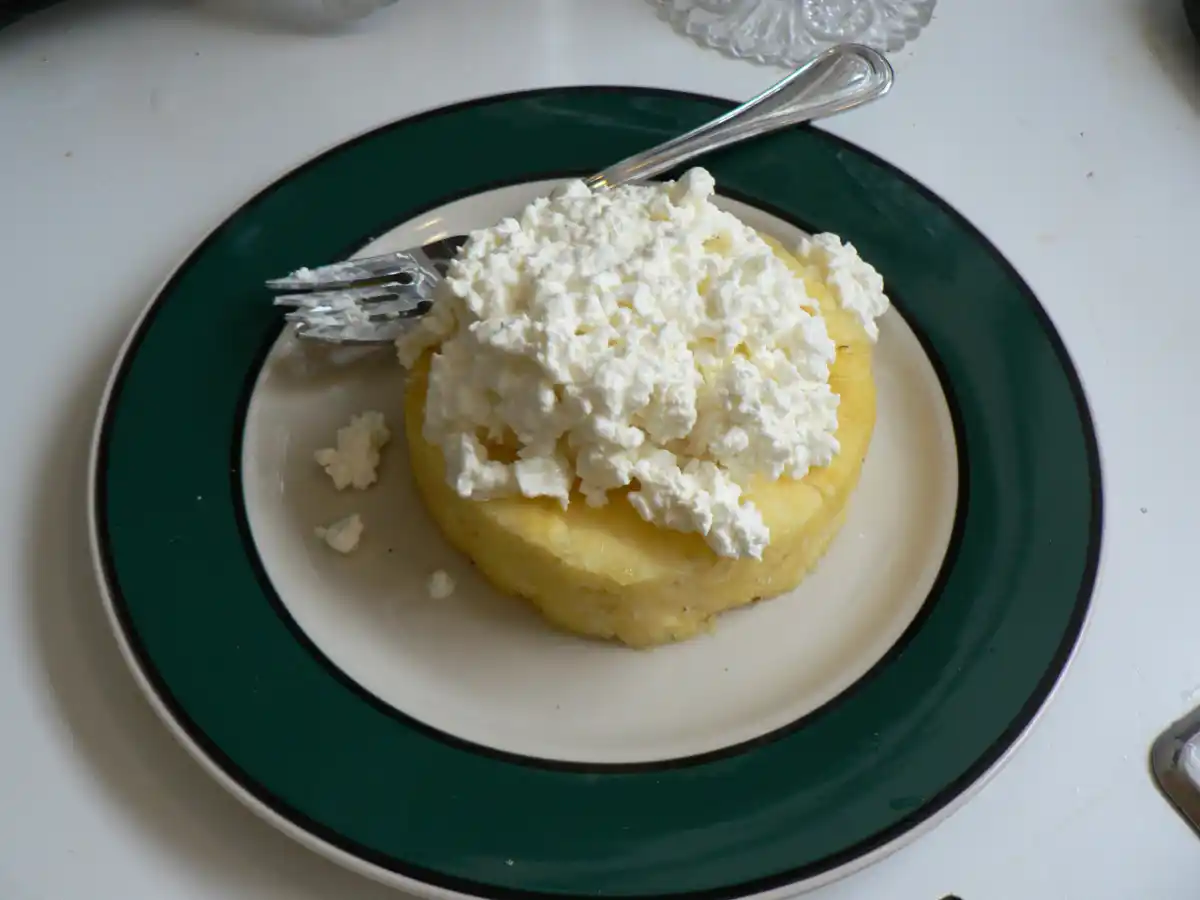Celiac.com 03/16/2024 - Cottage cheese, a beloved dairy product enjoyed by many, is often hailed for its creamy texture and versatility in various culinary creations. We've written about brands of gluten-free cottage cheese, but for those following a gluten-free diet due to celiac disease or gluten sensitivity, the question of whether cottage cheese is safe to consume often arises. To answer this question definitively, we must delve into the production process of cottage cheese and examine its ingredients.
Cottage cheese is traditionally made by curdling milk with an acidic substance, such as lemon juice or vinegar, and then draining the whey to form curds. These curds are then washed and mixed with cream or milk to achieve the desired consistency. The result is a soft, lumpy cheese with a mild flavor, prized for its high protein content and versatility in both sweet and savory dishes.
Celiac.com Sponsor (A12):
Typically, the ingredients in cottage cheese include milk, cream, salt, and sometimes additional flavorings or stabilizers. However, some commercially produced cottage cheese products may include flavorings, seasonings, or additives that could potentially contain gluten. These additives might be used for various purposes, such as enhancing flavor, extending shelf life, or adjusting texture. Therefore, it's essential for individuals following a gluten-free diet to carefully read the ingredient labels on cottage cheese products to ensure they do not contain any gluten-containing additives.
Common Ingredients Used in Commercial Cottage Cheeses
- Cultured Pasteurized Skim Milk: The primary ingredient in cottage cheese, milk provides the base for the cheese and contributes to its creamy texture and flavor.
- Cream: Cream is often added to cottage cheese to enhance its richness and creaminess, resulting in a smoother texture and milder flavor.
- Salt: Salt is used to season cottage cheese, adding flavor and helping to preserve the cheese by inhibiting the growth of harmful bacteria.
- Cultures: Cultures, such as Lactobacillus bulgaricus and Streptococcus thermophilus, are added to the milk to initiate the fermentation process, which transforms the milk into cheese and contributes to its tangy flavor and texture.
- Enzymes: Enzymes, such as rennet, are used to coagulate the milk and form curds during the cheese-making process, resulting in the formation of the characteristic curds and whey of cottage cheese.
- Guar Gum: Stabilizers help to improve the texture, consistency, and shelf life of foods by preventing ingredients from separating or settling. In cottage cheese, guar gum and xanthan gum are often added to provide a smoother and creamier texture, as well as to prevent whey separation.
- Xanthan Gum: Stabilizers help to improve the texture, consistency, and shelf life of foods by preventing ingredients from separating or settling. In cottage cheese, guar gum and xanthan gum are often added to provide a smoother and creamier texture, as well as to prevent whey separation.
- Carrageenan: Extracted from certain species of red seaweed and is used as a thickening and stabilizing agent in cottage cheese. It helps to maintain the desired texture and consistency of the product, as well as to prevent whey separation.
- Locust Bean Gum: Locust bean gum, also known as carob gum, is derived from the seeds of the carob tree. It is used as a thickening and stabilizing agent in cottage cheese to help improve texture and prevent separation.
- Citric Acid: Citric acid is often added to cottage cheese as an acidity regulator and flavor enhancer. It helps to achieve the desired level of acidity in the cheese, which contributes to its tangy flavor. Additionally, citric acid can help to preserve the freshness of the cheese by inhibiting the growth of spoilage bacteria.
- Potassium Sorbate: Some commercial cottage cheeses may contain preservatives, such as potassium sorbate or sodium benzoate, to extend their shelf life and maintain freshness.
- Natural Flavors: Natural flavors are used in cottage cheese to enhance its taste and aroma. These flavors are derived from natural sources such as fruits, vegetables, or spices, and are added to impart specific flavor profiles to the cheese. Natural flavors can vary widely and may include ingredients like herbs, spices, or fruit extracts, depending on the desired flavor profile of the cottage cheese.
- Annatto: Annatto is a natural food coloring derived from the seeds of the achiote tree. It is commonly used in cottage cheese to impart a yellow or orange color to the cheese, giving it a more visually appealing appearance. Annatto is preferred over synthetic food dyes as it is a natural and plant-based coloring agent.
- Vitamin A Palmitate: Vitamin A palmitate is a form of vitamin A that is often added to cottage cheese as a nutrient fortifier. Vitamin A is essential for maintaining healthy vision, immune function, and skin health. By fortifying cottage cheese with vitamin A palmitate, manufacturers can enhance the nutritional value of the cheese and provide consumers with an additional source of this important vitamin.
In the USA, Wheat Must be Disclosed on the Ingredient Label
According to labeling regulations, wheat must be clearly disclosed on the ingredient label of food products if it is used as an ingredient. Additionally, if there is any risk of cross-contamination with wheat during the manufacturing process, manufacturers are required to include this information on the label as well. This is crucial for individuals with celiac disease or gluten sensitivities to make informed choices about which products are safe for consumption. Therefore, when purchasing cottage cheese or any other food product, it's essential to carefully check the ingredient label for any mention of wheat or potential cross-contamination.
Most commercially produced cottage cheese brands are naturally gluten-free since they typically contain only milk, salt, and bacterial cultures. However, it's essential to double-check the ingredient list to ensure that no gluten-containing additives or flavorings have been included.
Six Cottage Cheese Brands Labelled Gluten-Free, or Naturally Gluten-Free:
- Daisy Brand: Known for its pure and simple ingredients, Daisy Brand offers gluten-free cottage cheese varieties. Visit their website for more information.
- Horizon Organic: Horizon Organic produces a range of organic dairy products, including gluten-free cottage cheese.
- Organic Valley: Organic Valley offers organic cottage cheese made from gluten-free ingredients.
- Good Culture: Good Culture specializes in organic cottage cheese with simple ingredients and no added gums or stabilizers.
- Nancy's: Nancy's offers organic and probiotic-rich cottage cheese made from gluten-free ingredients.
- Knudsen: Knudsen also offers gluten-free cottage cheese options.
In conclusion, cottage cheese is a versatile and nutritious dairy product that can be enjoyed by many, including those with gluten sensitivities or celiac disease. While most commercially produced cottage cheese brands are naturally gluten-free, it's essential to check labels for any gluten-containing ingredients and look for explicit gluten-free labeling when available. By understanding how cottage cheese is made and being mindful of potential sources of gluten, individuals can confidently incorporate this delicious dairy product into their gluten-free diet. Remember to always consult with healthcare professionals or registered dietitians for personalized dietary advice and recommendations. Enjoy your gluten-free cottage cheese with peace of mind and savor its creamy goodness in your favorite dishes and recipes!










Recommended Comments
Create an account or sign in to comment
You need to be a member in order to leave a comment
Create an account
Sign up for a new account in our community. It's easy!
Register a new accountSign in
Already have an account? Sign in here.
Sign In Now